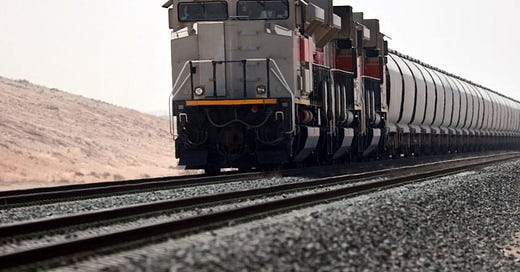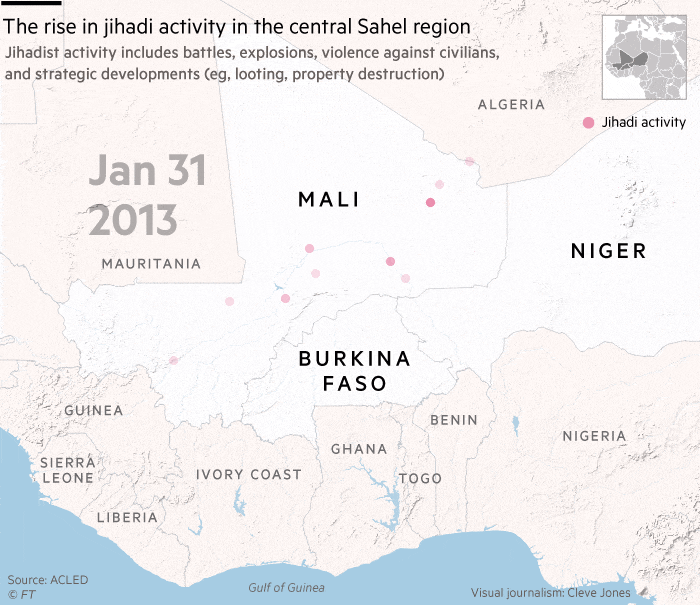Emerging Markets Daily - June 27
Global IPO Market Sizzles, Instability in Sahel Fueled by Gold Rush, China and Tanzania Revive Indian Ocean Port Talks, UAE Rail Network, and What Currencies Say About Cultures
The Top 5 Emerging Markets Stories from Global Media - June 27
The Global IPO Market Has Never Been Hotter Than It Is Right Now
Bloomberg
“Companies are racing to public markets like never before, cashing in on record-high stock prices.”
“An all-time high of almost $350 billion has been raised in initial public offerings in the first six months of this year, according to data compiled by Bloomberg, surpassing the previous peak of $282 billion from the second half of 2020 and enriching entrepreneurs and bankers alike.”
“Everyone from Swedish oat-milk company Oatly Group AB to bootmaker Dr. Martens Plc sold shares in 2021. Still, tech accounts for a big chunk of the deals. Didi Global Inc. will rank among the biggest U.S. IPOs of the past decade if the Chinese ride-hailing giant carries through with plans to sell as much as $4 billion in stock.”
“‘The markets from New York to Hong Kong were on fire in the first half of this year and have left even the late 90s dotcom boom era in the rearview mirror,’ said Aaron Arth, head of the financing group at Goldman Sachs Group Inc. in Asia ex-Japan.” Swetha Gopinath and Myriam Balezou report
Instability in the Sahel: How a Jihadi Gold Rush is Fueling Violence in Africa
The Financial Times
“Solhan lies in northeastern Burkina Faso, which forms part of the tri-state region with Mali and Niger that has for the last few years been at the centre of a surge in jihadi activity, killing thousands, displacing millions and rendering wide swaths of the region completely ungoverned. The wave of violence, now increasingly targeting gold mining areas, is threatening to destabilise the wider region, including coastal states such as Ivory Coast and Ghana.”
“…Gold mining can be a murky business. Artisanal processing by the likes of Ouedraogo and his colleagues is fraught with health and environmental issues. Children often work in small-scale mines. The informal side has long been a playground for money launderers, smugglers and criminals. Unlike precious stones, traceability remains elusive — there is no equivalent of the flawed Kimberley Process for diamonds. In part that is because it is not as easy to chemically trace a particular piece of gold to a specific mine. Gold from all over the world gets melted together in refining centres such as Dubai, where most west African gold is shipped before it heads to jewellers in the west, India and China.” Neil Munshi reports
Tanzania to Revive $10bn Indian Ocean Port Project with China
Nikkei Asia
“…Beijing had high hopes for the East African nation. Facing the Indian Ocean, state planners believed that the country could serve as the main gateway to China -- where resources could be brought from across the continent and loaded onto ships headed for the mainland.
“…The ambitious plan later stalled, reportedly due to frustration on the Tanzanian side over the conditions China had presented, including a request that Tanzania not question who invests in Bagamoyo once the port was operational.”
“…Last year, in a series of tweets, Chinese Ministry of Commerce official Cheng Wang, who was the officer in charge of East African affairs at the ministry between 2013 and 2017, said that once Bagamoyo was complete, the new port and Dar es Salaam would have a relationship similar to Hong Kong and Shenzhen.” Ken Moriyasu reports
Fledgling UAE Rail Network Step Towards Bridging the Gulf
The Jordan Times / AFP
“In the emirate of Abu Dhabi, Ibrahim Al Hammadi inspects a freight train on the UAE's first railway line. He climbs aboard the locomotive, does a final systems check and then it is full steam ahead.”
“Hammadi is the first Emirati to become a train driver — in a country which already has a space programme and two of the world's biggest airlines, but is only now developing a rail network to connect all seven of its emirates.”
“…When completed, Etihad Rail will operate 1,200 kilometres of track connecting all of the emirates — from Ghweifat in the western region of Abu Dhabi to the emirate of Fujairah on the eastern coast — and link with neighbouring Saudi Arabia.”
“The long-term plan is to be part of a wider railway network that would connect all six Gulf Cooperation Council countries (GCC), including Bahrain, Kuwait, Oman and Qatar as well as the UAE and Saudi Arabia.” Jordan Times / AFP report
The Ancient Word Linking Oman, Thailand and Aboriginal Australia
The National
“Throughout the Gulf, the names of currencies reflect the history of global trade. And that history reveals a great deal about language itself.”
“Dinar is derived from the denarius, a Roman coin, while dirham goes back to the Ancient Greek drachma; rial comes from the Spanish real, meaning ‘royal’.”
“But one currency that expresses the shared past of an entire continent is the Omani rial, which is divided into baisa, a Hindi/Urdu loanword (paisa) with roots in Sanskrit. The word paisa, in fact, is spread all over the Indian Ocean world, from Myanmar to Mauritius and nearly everywhere in between.” an opinion piece by Alexander Jabbari




